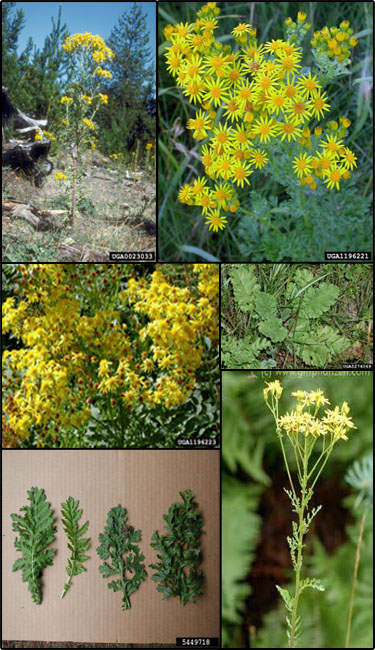Stinking willie (Senecio jacobaea)
 Synonyms: Jacobaea vulgaris
Synonyms: Jacobaea vulgarisCommon Names: Tansy ragwort, Ragwort
Description: Introduced to North America as a medicinal herb. Very poisonous causing environment deterioration, loss of pasture for grazing and death of livestock.
Habit: Biennial or short lived perennial; ranges from 1-6 ft tall, deep taproot system.
Leaves: Arranged up the coarse stem and are 2-3 times pinnately lobed.
Stems: Erect; purplish-red in color; grows 1-6 ft tall.
Flowers: Daisy-like flower heads, yellow in color, disk and ray flowers up to 0.5 inch long.
Fruit and seeds: Easily transported by wind, water or animals, 150000+ seeds produced per plant, seeds can remain viable for up to 4-5 years on the surface or up to 20 if buried.
Habitat: Native to Eurasia. Found in creek bottom areas, pastures, forest clear-cuts, overgrazed pasture, and along roadsides.
Reproduction: By seed or vegetatively from damaged plants.
Similar species: Golden ragwort (Packera aurea); Common tansy (Tanacetum vulgare); Perennial sow thistle(Sonchus arvensis).
Monitoring and rapid response: Hand-pull isolated plants and small patches and remove as much of the root as possible; easily controlled in the seedling to young rosette stage with the herbicide 2, 4-D as either the amine or low-volatile ester formulation, herbicide dicamba (Banvel) or dicamba plus 2, 4-D. Credits: The information provided in this factsheet was gathered from the USDA PLANTS Database and the U.S. Department of Agriculture, Forest Service.
Individual species images that appear with a number in a black box are courtesy of the Bugwood.org network (http://www.invasive.org).Individual photo author credits may not be included due to the small display size of the images and subsequent difficulty of reading the provided text. All other images appear courtesy of Google (http://images.google.com).
Common Name: | Stinking willie |
Scientific Name: | Senecio jacobaea |
Family: | Asteraceae (Aster) |
Duration: | Perennial |
Habit: | Herbs |
USDA Symbol: | SEJA |
